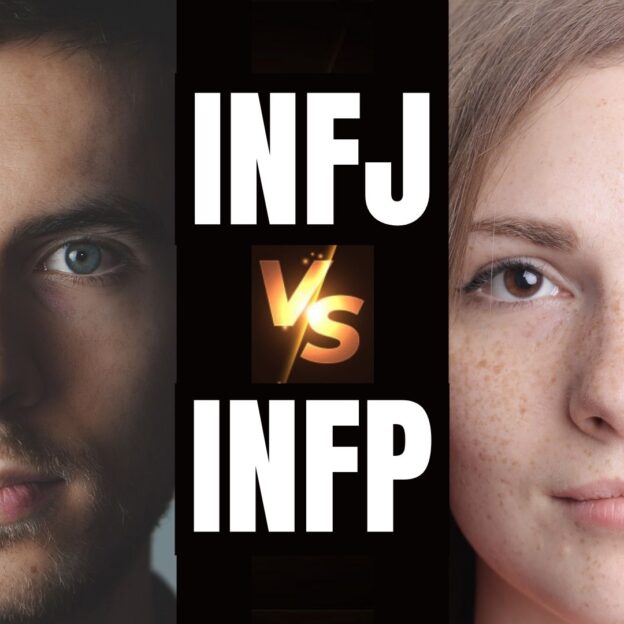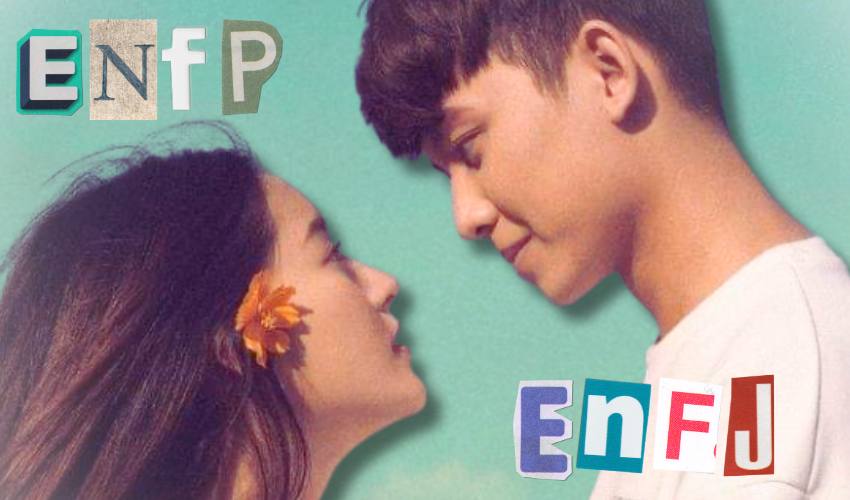As introverted idealists, the INFP and INFJ share many similarities. They are both introverted, abstract and imaginative. They also share a stronger regard for their humanity than for technical knowledge and cold logic. Because they are both INFX types, they appear very similar but in fact share none of the same cognitive functions. Each of their perceiving and judging functions are opposite in orientation. INFP has introverted feeling while INFJ uses extraverted feeling. INFP uses extraverted intuition while INFJ employs introverted intuition.
Temperament-wise, these two types have a lot in common but they also have distinct differences. Here is a breakdown of the INFP and INFJ personality types and what sets them apart from one another.
1. INFPs focus more on divergent possibilities While INFJ looks for convergent meanings.
The nature of INFP’s Ne vs. INFJ’s Ni encompasses different forms of abstract thinking. INFPs are prone to use their intuition by extracting from the real world, spontaneous ideas and inspirations. When they engage with the world, the feelings it draws out of them sparks and ignites their creative engine. INFPs are apt to be more open to many possibilities and meanings rather than commit to any one true answer or interpretation.
INFJs by contrast, rely on their intuition to deliver insight about the deeper meaning behind what they perceive. INFJs are more focused on gaining a holistic perspective that allows them to more accurately understand what is going on, what significance it has and what it means for the future. Additionally, INFJs are more in tune with the unconscious symbolism of their dreams and the recognition of various patterns.
2. INFP’s Develop a More Subjective Moral Sense and Value System than the INFJ.
Compared with the INFJ, INFPs are more selective about what they choose to care about. They are inclined to define for themselves what is good or bad according to what feels right to them personally. Their reasoning doesn’t have to be entirely rational and may often appear arbitrary or self-serving. They could just as easily espouse a philosophy of unconditional love and forgiveness or a vindictive “eye for an eye” lust for vengeance. INFPs lean away from conventional wisdom and prevailing group sentiments that don’t resonate with their subjective ideals. Furthermore, they strive to be authentic and to explore their own feelings as a source of moral truth and spiritual guidance. Although they are empathetic, sensitive and receptive, INFPs resist allowing other people to control or dictate what is best for them.
INFJs tend to weigh the feelings and needs of others more heavily in their decision-making and rationale. External social and interpersonal factors are taken into deeper consideration. The INFJ’s value system is more collaborative and integrated with the people around them. They therefore are more apt to adjust themselves when needed, in order to understand and relate to others. INFJs are keen on enriching others with their insights and knowledge. Many are attracted to teaching roles as an opportunity to play a hand in the cultivation of human potential. A personal sense of obligation and responsibility to others underscores the moral values that INFJs promote. INFJs are inclined to often focus more on the wellbeing of others than themselves.
3. INFJ Has More Analytical Tendencies Than The INFP.
INFJs have tertiary Introverted Thinking which represents a penchant for thinking things through logically. INFJs use a subjectively developed logical framework to inform their decisions aside from their Extraverted Feeling. They are less inclined than the INFP to rely on arbitrary whims and feelings to guide their judgement. They instead prefer some form of logical consistency and objective truth to guide and hold themselves to. When immersed in their own introverted world, INFJs are apt to spend a lot of time pondering theories and analyzing how something works or trying to prove or disprove the veracity of some idea or notion. INFJs have intuitions that they often try to parse out and make sense of logically.
4. INFPs Have a Stronger, Visual Memory.
INFPs have tertiary Introverted Sensing which indicates a capacity for retaining specific details and remembering things for a long time. Compared with the INFJ, INFPs may have a stronger attachment to the past. Because of their dominant feeling function, they are inclined to especially hold onto memories that carry emotional significance. Their storied personal history is likely to follow them and sometimes haunt them throughout life. If it is tainted with negative and painful experiences, INFPs may become increasingly withdrawn and private because of it. However, because they are so able to access and relive the feelings and visual imagery associated with those memories, it may also enhance the realism and vivid details channeled through their art and creative endeavors.
5. INFJs are Subconsciously attracted to Extraverted Sensors While INFPs are drawn to Extraverted Thinkers.
INFJ has inferior Extraverted Sensing and INFP has inferior Extraverted Thinking. The inferior functions of these types indicate areas they are likely to neglect in themselves but subconsciously appreciate in others who utilize them well. For INFJ, the candid and exciting spirit displayed by ESTPs and ESFPs is likely to hold a certain allure. Extraverted Sensing represents something INFJs don’t feel naturally adept at and subconsciously, may try to compensate for this in the people they become enamored with. INFJs themselves tend to be more picky and discriminating about the substance and quality of what they observe which can make them seem slightly pretentious in their tastes.
INFPs for their part, have a subconscious attraction to Extraverted Thinking. INFP’s conscious ego centers on a preference and focus on inner control. Additionally, they feel most comfortable wielding control over the subjective realm of personal potential and moral truth. INFPs feel less adept in the quantitative, objective world of systems and crystallized structure. Personality types like the ESTJ, and ENTJ who use Te naturally and comfortably are likely to appear enticing to INFP on a subconscious level. Such people may be appealing on account of the INFP’s unconscious Te aspirations to cultivate technical proficiency and also support and incorporate their Fi values into functional and fruitful enterprises.
related posts:
- INTP vs INFP Similarities and Differences
- INFP Shadow: The Dark Side of INFP
- The INFP Personality; What It Means to be the Mediator MBTI Type
- 7 Major Weaknesses of the INFP Personality
- 6 Best Paying Careers for the INFP Personality
- 6 Reasons Why INFP and INFJ Fall In Love
- 12 Variations of INFP: Zodiac and the MBTI
- 33 Strong Signs You’re a True INFP
- INFJ Compatibility with the Rational Types
- INFJ Defined: What It Means to be the INFJ Personality Type
- The Dark Side of the INFJ Personality
- ISFJ and ISTJ in love: 5 Essential Dynamics of their Relationship - February 24, 2024
- ENTP and ENTJ in love: 6 Critical Dynamics of Their Relationship. - February 18, 2024
- ESTJ and ESFJ in love: 4 Key Aspects of their Relationship. - February 12, 2024





